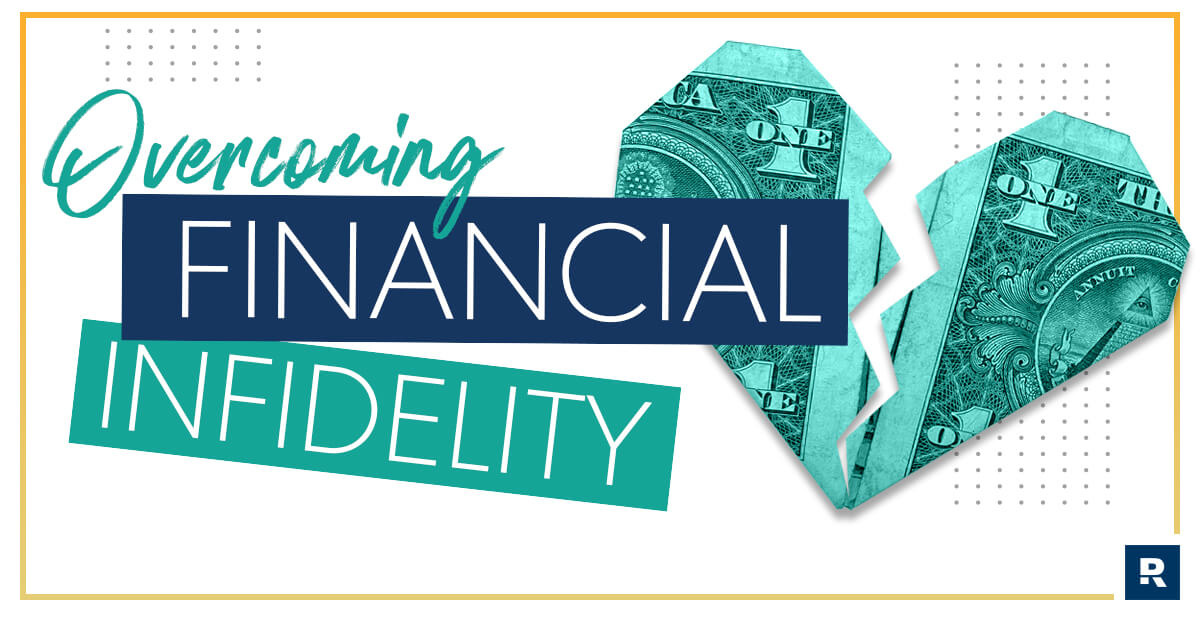
Key Takeaways
- Financial infidelity happens when you or your spouse intentionally lie about money.
- Some common signs of financial infidelity are hiding purchases or having a secret bank account.
- Rebuilding after financial infidelity requires honest communication, accountability and a shared plan (including a budget) to move forward together.
Money fights are the worst. Well, let’s face it: All fights are pretty awful. But if you and your spouse (or significant other) have been fighting about money, you’re not alone.
Get expert money advice to reach your money goals faster!
In fact, 41% of married couples say fighting is almost inevitable when they talk about money.1 That’s why it’s so important to keep your lines of communication open. Because when you and your spouse aren’t communicating about money, you can both end up feeling guilty about your spending habits, lying about your spending habits, or worse . . . slipping onto financial infidelity.
Today, I’m shining some light onto financial infidelity: What it is, signs to look for, and how to overcome it.
What Is Financial Infidelity?
Financial infidelity happens when you or your spouse intentionally lie about money. When you deliberately choose not to tell the truth about your spending habits (no matter how big or small), that is financial infidelity.
You might be thinking, Rachel, isn’t that being a little harsh? Sure, it may start out as an innocent purchase here or there. But things go downhill when you start hiding your latest shopping spree purchases and praying your spouse doesn’t find them. Yeah . . . that might be a problem.
Financial infidelity can be pretty serious—especially when it goes on for too long. But just because it’s serious doesn’t mean there’s no hope. If I know one thing, it’s that there’s always hope. Especially in the hard stuff.
Listen: If you or your spouse is dealing with financial infidelity, you’re not alone. In fact, it happens more than you might think. One in three people who are married admit to hiding a purchase from their spouse. And 31% of couples say they have a credit card their spouse doesn’t know about.2
Financial Infidelity vs. Financial Irresponsibility
When it comes to money, there’s a difference between straight up lying and just being irresponsible (or forgetful).
I get asked all the time what the difference is between financial infidelity and financial irresponsibility. A few years ago, a woman came up to me at an event I was speaking at almost in tears. She had just found out her husband had gone out to lunch three times that month . . . and never told her. She was pretty devastated and fully believed he committed financial infidelity.
Listen, you guys—forgetting to tell your spouse that you went to Chick-Fil-A a few times this month is not infidelity. That’s just financial irresponsibility. But if that sweet woman’s husband knew she wouldn’t approve of him spending money at a restaurant and intentionally hid it from her . . . that’s infidelity. See the difference?
6 Signs of Financial Infidelity
I don’t know about you, but financial infidelity is not something I want to invite over for pizza night. It’s like inviting a bear into the front door and being shocked that it terrorized your brand-new throw pillows.
That, my friends, is why it’s so important to keep your money spending behaviors in check (and know what to look for too).
Here are six telltale signs of financial infidelity:
1. Hiding a purchase intentionally.
Relationships are built on trust, and that’s why honesty is the best policy (no matter what). So, if you buy something and hide it from your husband or wife, you’re taking a dive in the deep end. Remember, a budget is the best way to get on the same page—and spend money guilt free.
2. Getting cashback without telling your spouse.
This one can seem fairly harmless, but cashback rewards on your debit card purchases can add up pretty quickly. It may start out as a harmless $10 here or $20 there. But before you know it, you could be pulling out some serious cash without telling your spouse. Not only will your bank account start to dwindle, but so will their trust. Ouch.
3. Having a secret savings account.
This one is tough. When you and your spouse are on the same page about money, you’re probably on the same page about your money goals. A secret savings account will only put a wrench in your family’s money goals.
4. Stashing bills.
I love birthday cash. I love knowing that I have my very own “stash” of cash to spend however I want. But when stashing cash goes beyond the gifts and moves into stashing paychecks, that’s another story.
5. Opening secret credit cards or new accounts.
Sometimes people open a secret credit card or bank account to make it easier to hide their spending from their spouse. I’ve already said that kind of thing is off-limits. But other times, one spouse is desperately trying to hide a financial mess by transferring credit card balances or taking out loans to pay the bills—all without telling their spouse. The damage you’re doing trying to “fix” the problem could be worse than the problem itself. If you’re further into debt than you care to admit, there’s hope. And it’s time to come clean.
6. Playing the dollar-for-dollar game.
Does your spouse have an expensive hobby? Maybe they golf, hunt or love to skydive for fun. Those things aren’t cheap. It’s easy to tell yourself that you should be able to match what your husband or wife is spending on their favorite things. In theory, that’s true. But you both need to agree to that plan and include it in your budget. Spending freely without your spouse’s knowledge is a dangerous game. If that’s you, quit while you’re ahead.
Need a Getaway With Your Spouse?
Spend three days in Nashville growing your connection. No interruptions, no to-do lists. Just the two of you building a stronger, more intimate marriage.
How to Overcome Financial Infidelity
If you or your spouse has committed financial infidelity, it’s not the end of the world! But you do have to come clean and work together to clean up the mess. There’s hope! And it starts with these four pillars of building a life you love—together:
1. Communicate.
Share everything. Yup—I mean everything. With marriage (and money), there’s no such thing as overcommunication. In fact, it’s better to say too much than not enough. Not only will that help rebuild trust, it will show your (or your spouse’s) commitment to stop hiding or lying about money.
2. Get on the same page.
You guys! Being on the same page with your spouse is so important for just about every aspect of life: raising kids, life goals, career choices and so much more. And the one thread that holds it all together is money. So, if you’re not on the same page (doing a monthly budget together), it’s time to start.
Budgeting is a game changer. Not only does it make you communicate about money, life goals and dreams, it helps you get there. If you’ve never done a budget together, that’s okay! It’s never too late to start. Check out our free budgeting app, EveryDollar. It’ll walk you step by step to creating a zero-based budget. After about three months, you’ll be pros.
3. Tell the truth always—even when you make a money mistake.
There’s nothing more gut-wrenching than the feeling when someone intentionally lied to you. And while it’s hard to tell the truth when you’ve got the weight of money mistakes on your shoulders, it’s harder to dig yourself out of the hole if you don’t. Marriage is a lifetime of ups and downs. But your spouse is your built-in accountability partner. They can help you grow, learn and build better habits just like you can do for them. It’s a beautiful thing! (Does anyone else need a hug?)
4. Get on a budget and spend without guilt.
So many people think a budget is there to keep you from spending money. And even though I’m Dave Ramsey’s daughter, I felt that way too. But now, I’m the biggest fan of budgeting you’ll probably ever meet. A budget actually helps me spend freely—without guilt.
A zero-based budget shows your money who’s in charge. That’s right, you get to tell every single dollar where to go. And get this: The average household finds $332 in their first month of budgeting with EveryDollar.
No matter what scale it’s on, financial infidelity can be tough to deal with. And sometimes, just working out the kinks in your communication and doing a regular budget won’t heal those wounds. If that’s the case, there’s no shame in seeking the help of a professional marriage counselor.
And as for the money mess, check out Financial Peace University. It’s a nine-lesson course that will teach you and your spouse how to get out of debt, save for emergencies, and take control of your life. Remember, when you combine your life goals with your budget, there’s no stopping what you and your spouse can accomplish—together!
Building a Future After Financial Infidelity
- If you recognize the signs of financial infidelity in your relationship, connect with a counselor or therapist you trust to start repairing your relationship.
- Get on the same page with your money. EveryDollar is a great tool to see everyone’s spending and create goals together.
- Surround yourself with a community who can support you by joining Financial Peace University.



